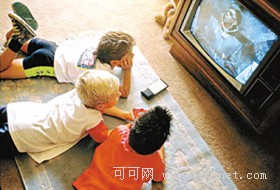Yes, but what did we use to do before there was television? How often we hear statements like this! Television hasn't been with us all that long, but we are already beginning to forget what the world was like without it. Before we admitted the one-eyed monster into our homes, we never fond it difficult to occupy our spare time. We used to enjoy civilized pleasures. For instance, we used to have hobbies, we used to entertain our friends and be entertained by them, we used to go outside for our amusements to theatres, cinemas, restaurants and sporting events. We even used to read books and listen to music and broadcast talks occasionally. All that belongs to the past. Now all our free time is regulated by the goggle box. We rush home or gulp down our meals to be in time for this or that programme. We have even given up sitting at table and having a leisurely evening meal, exchanging the news of the day. A sandwich and a glass of beer will do anything, providing it doesn't interfere with the programme. The monster demands and obtains absolute silence and attention. If any member of the family dares to open his mouth during a programme, he is quickly silenced.
Whole generations are growing up addicted to the telly. Food is left uneaten, homework undone and sleep is lost. The telly is a universal pacifier. It is now standard practice for mother to keep the children quiet by putting them in the living-room and turning on the set. It doesn't matter that the children will watch rubbishy commercials or spectacles of sadism and violence so long as they are quiet.
There is a limit to the amount of creative talent available in the world. Every day, television consumes vast quantities of creative work. That is why most of the programmes are so bad: it is impossible to keep pace with the demand and maintain high standards as well. When millions watch the same programmes, the whole world becomes a village, and society is reduced to the conditions which obtain in preliterate communities. We become utterly dependent on the two most primitive media of communication: pictures and the spoken word.
Television encourages passive enjoyment. We become content with second-hand experiences. It is so easy to sit in our armchairs watching others working. Little by little, television cuts us off from the real world. We get so lazy, we choose to spend a fine day in semi-darkness, glued to our sets, rather than go out into the world itself. Television may be s splendid medium of communication, but it prevents us from communicating with each other. We only become aware how totally irrelevant television is to real living when we spend a holiday by the sea or in the mountains, far away from civilization. In quiet, natural surroundings, we quickly discover how little we miss the hypnotic tyranny of King Telly.
1. What is the biggest harm of TV?
[A] It deprives people of communication with the real world.
[B] People become lazy.
[C] People become dependent on second-hand experience.
[D] TV consumes a large part of one's life.
2. In what way can people forget TV?
[A] Far away from civilization.
[B] To a mountain.
[C] By the sea.
[D] In quiet natural surroundings.
3. What does a mother usually do to keep her children quiet?
[A] Let them watch the set.
[B] Put them in the living room.
[C] Let them watch the rubbish.
[D] Let them alone.
4. What does the first sentence in the first paragraph mean?
[A] We found it difficult to occupy our spare time.
[B] We become addicted to TV.
[C] What we used to do is different from now.
[D] We used to enjoy civilized pleasures.












